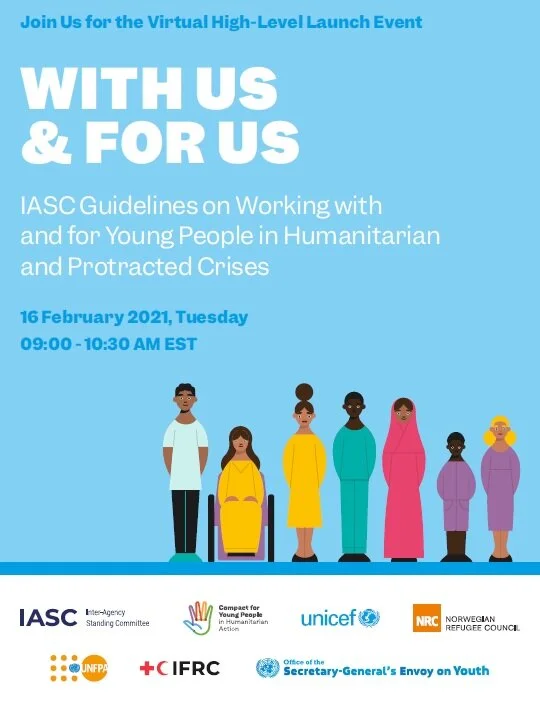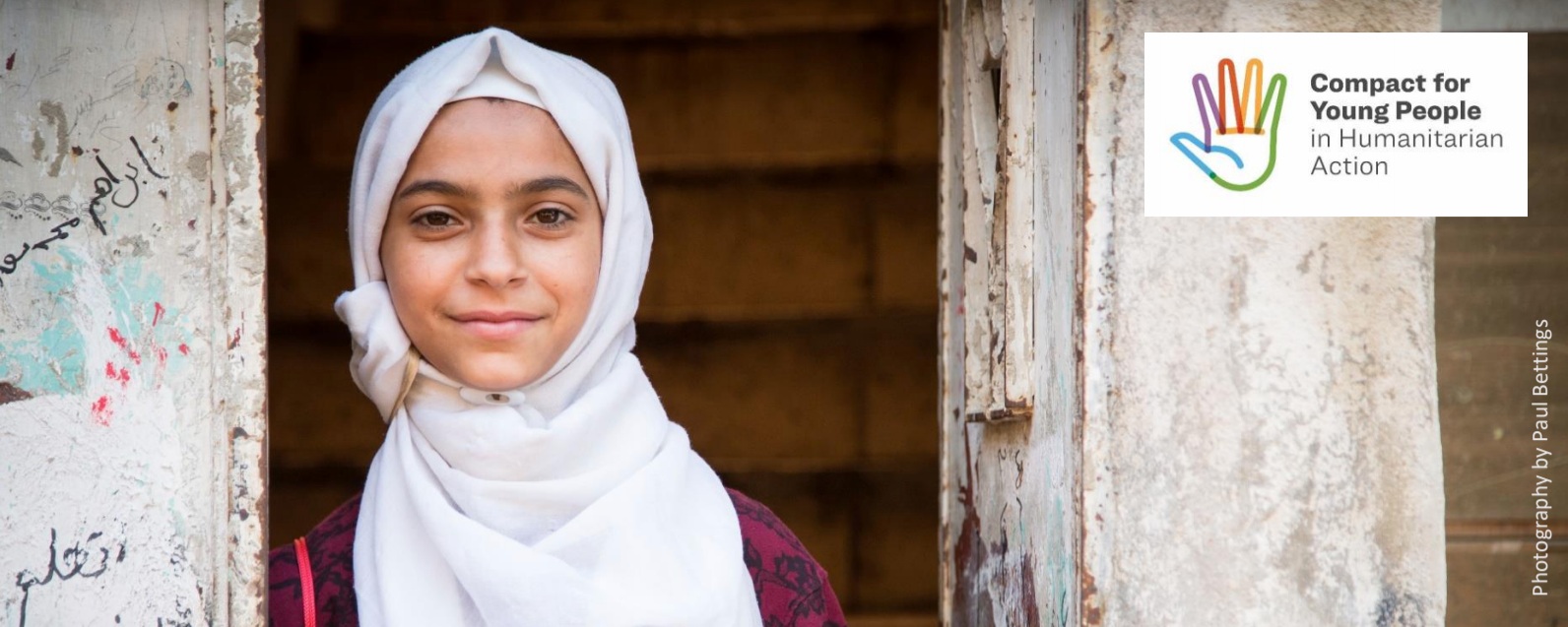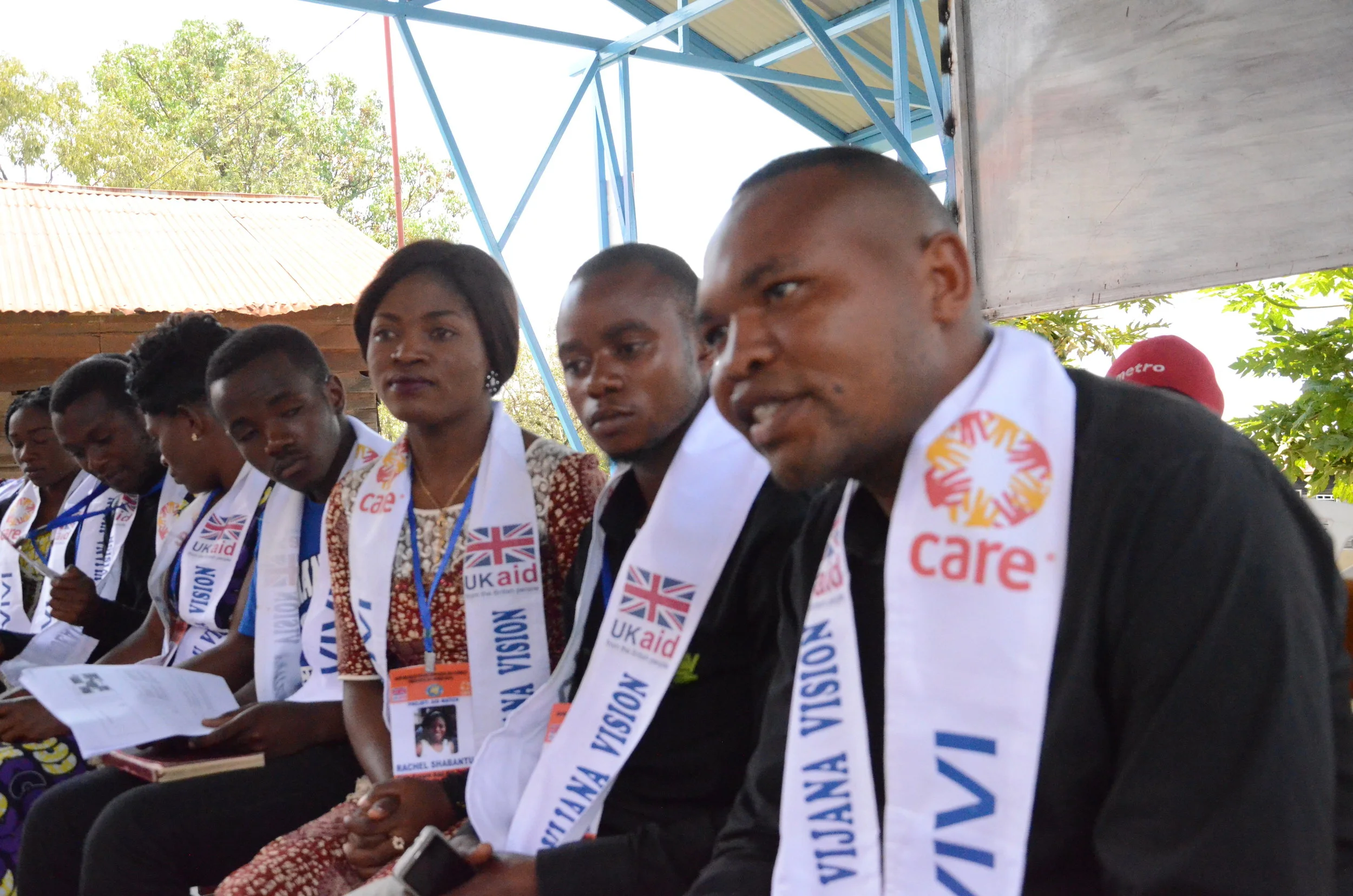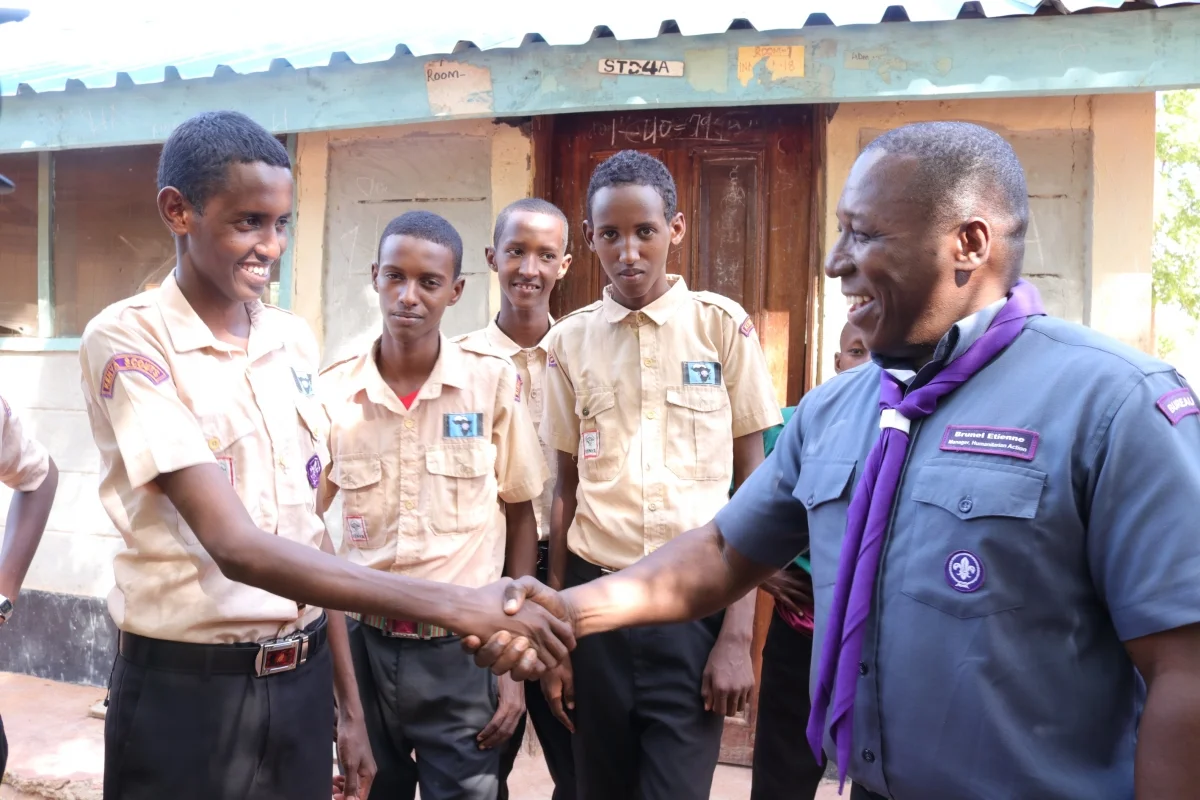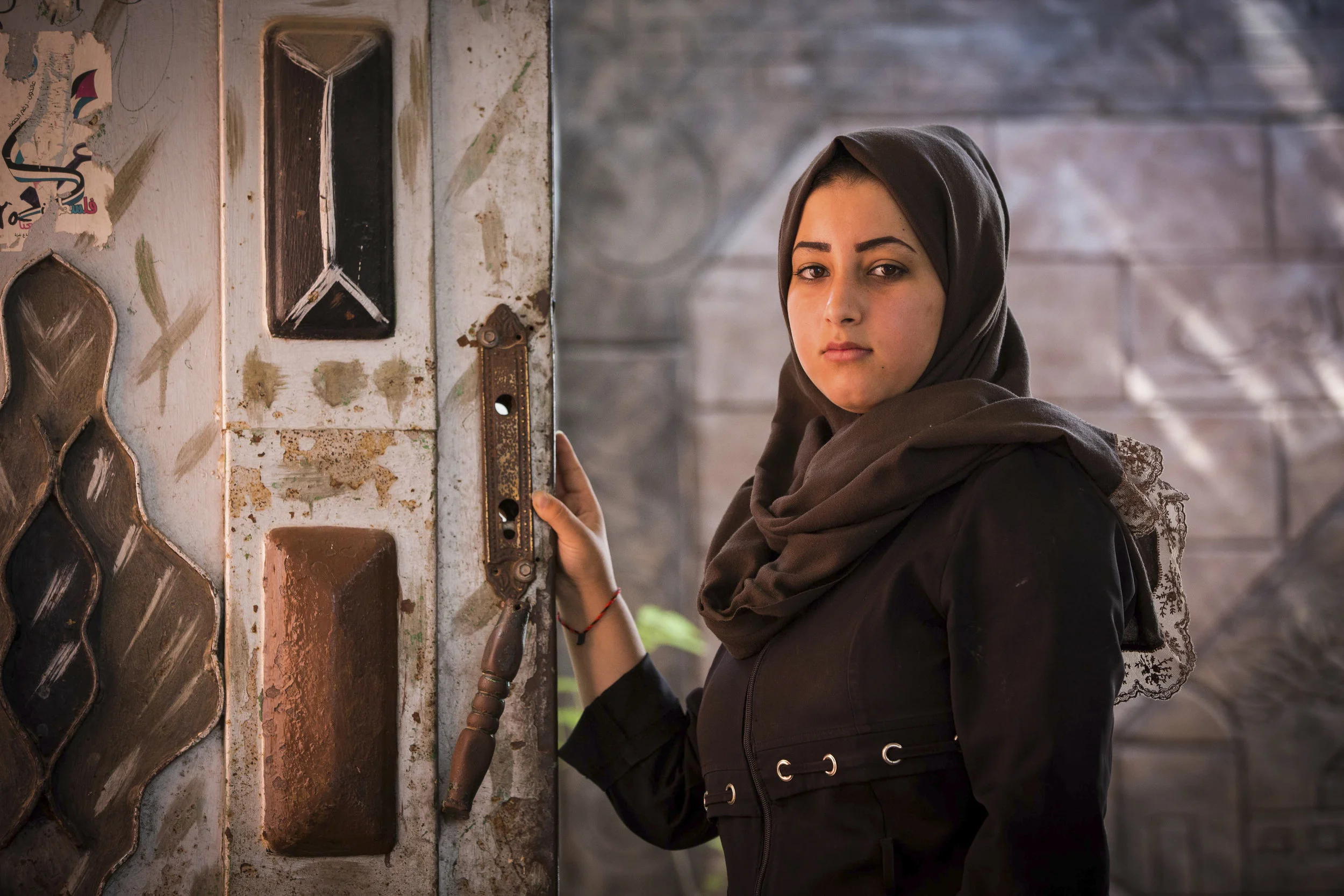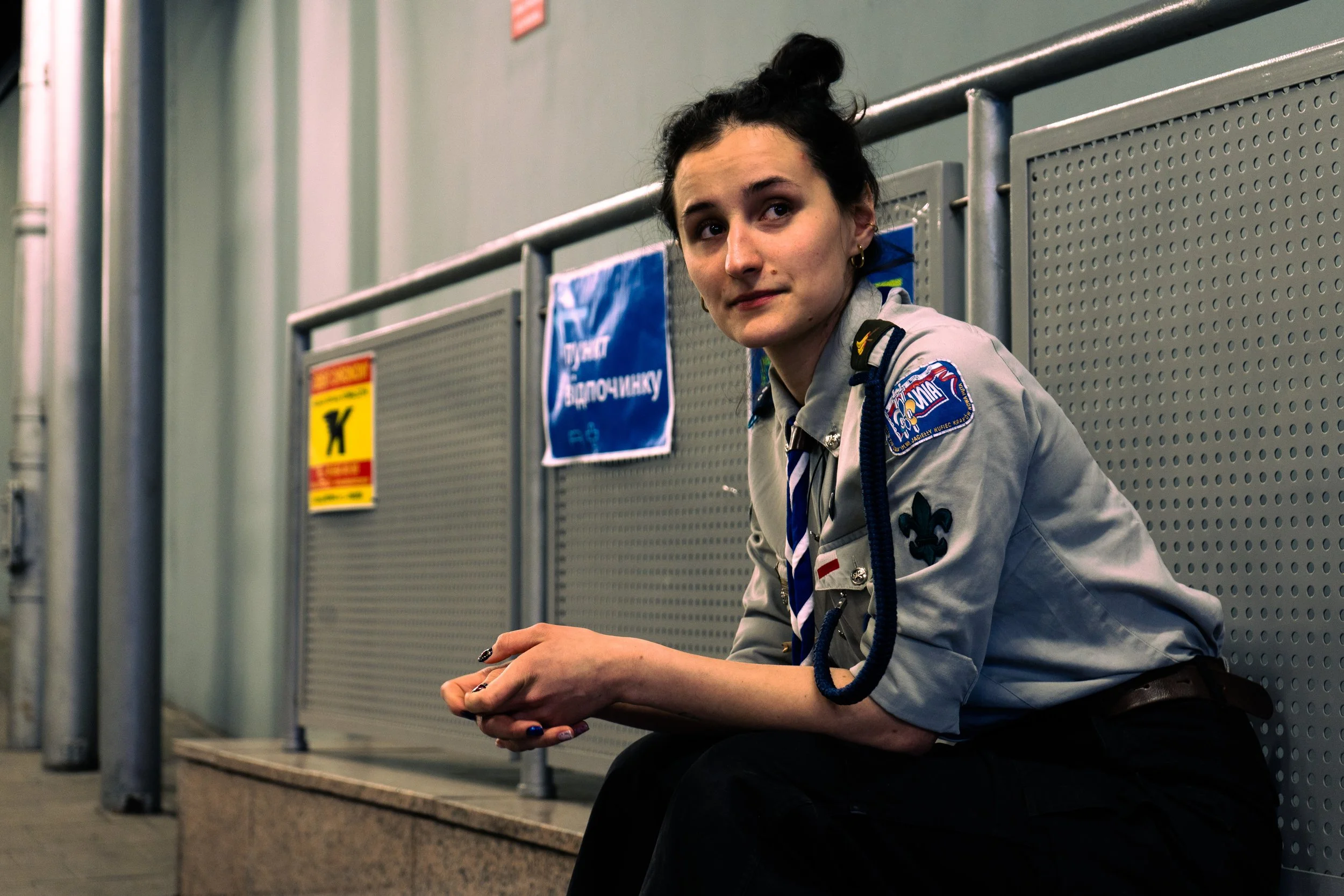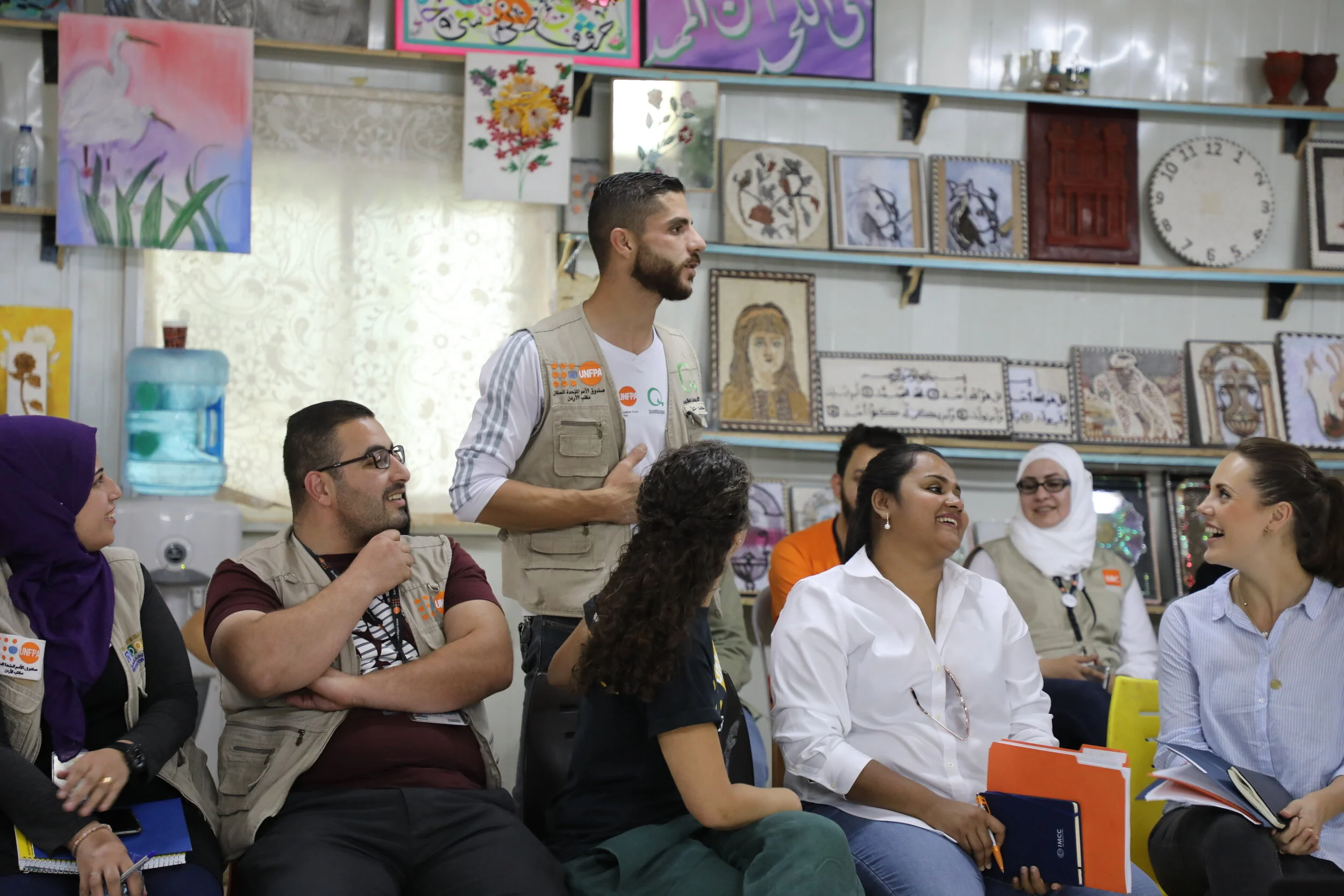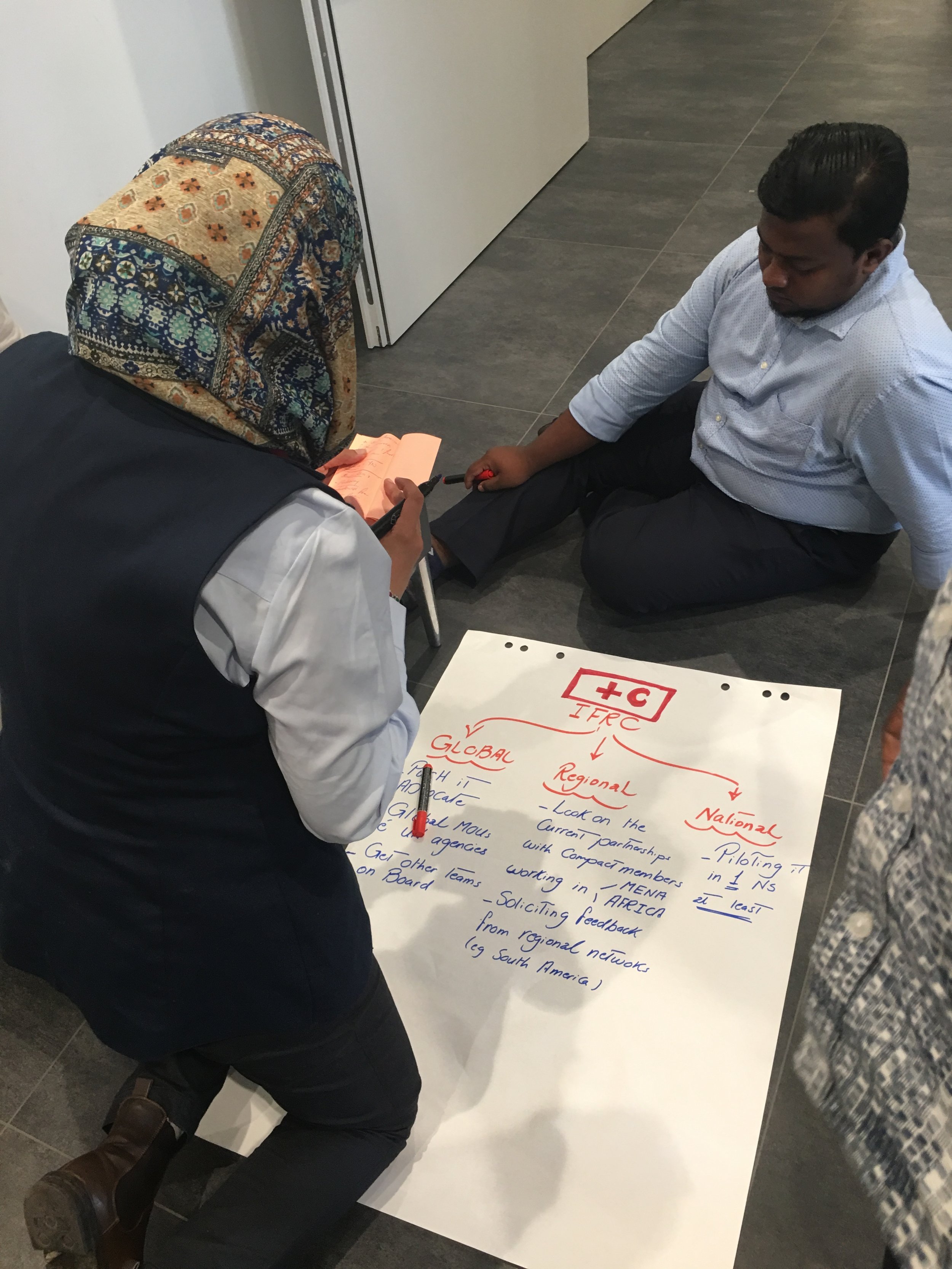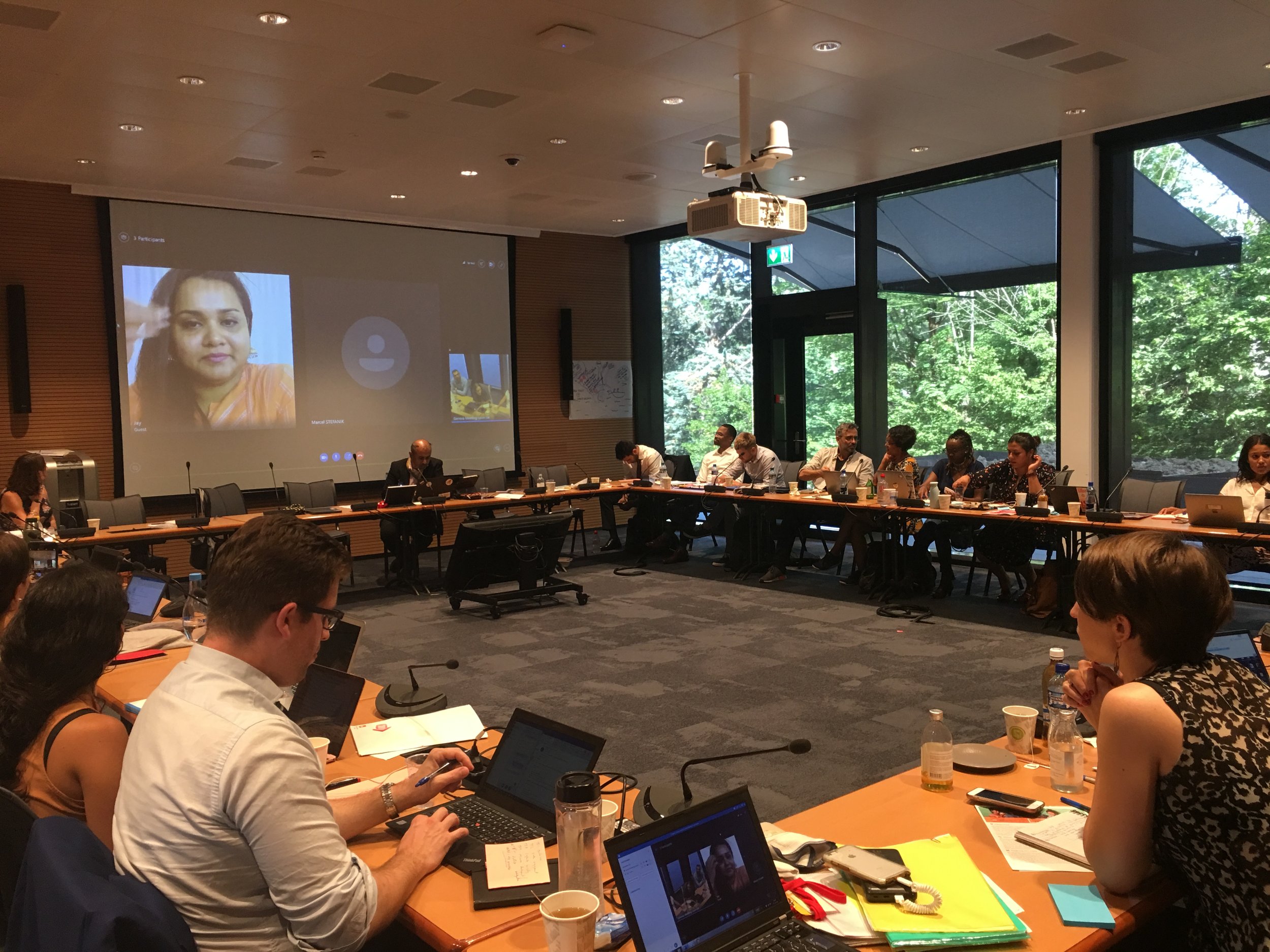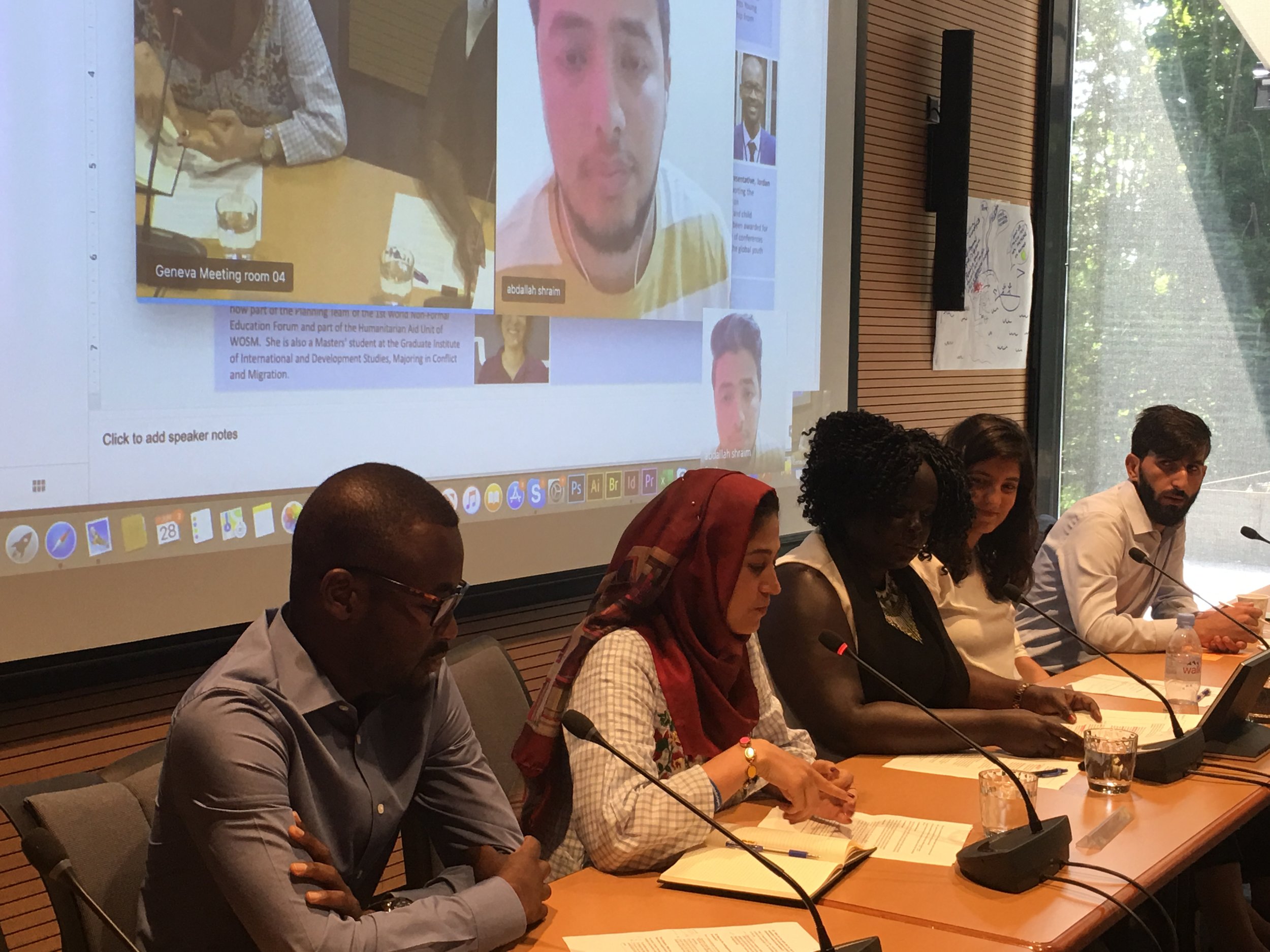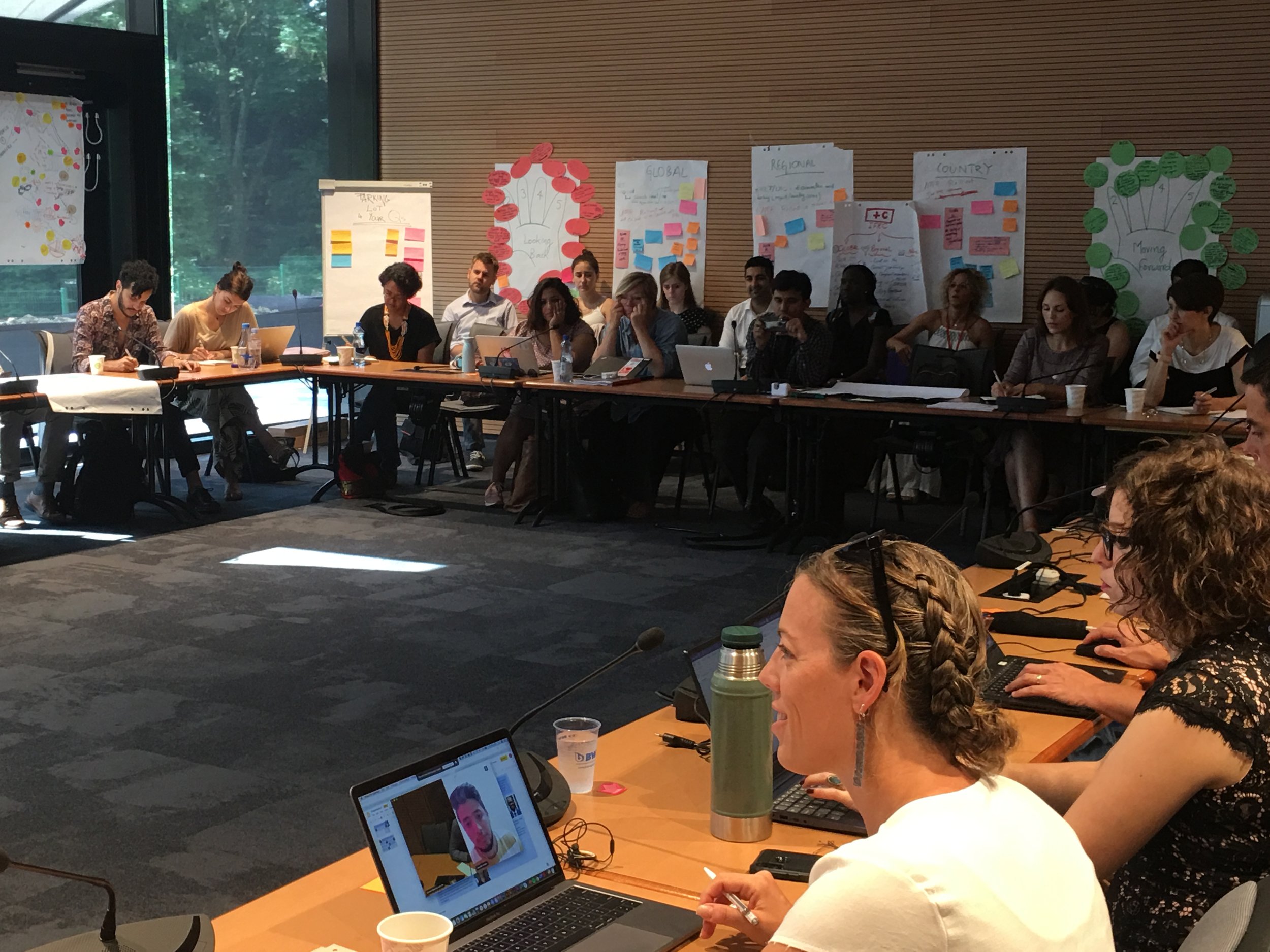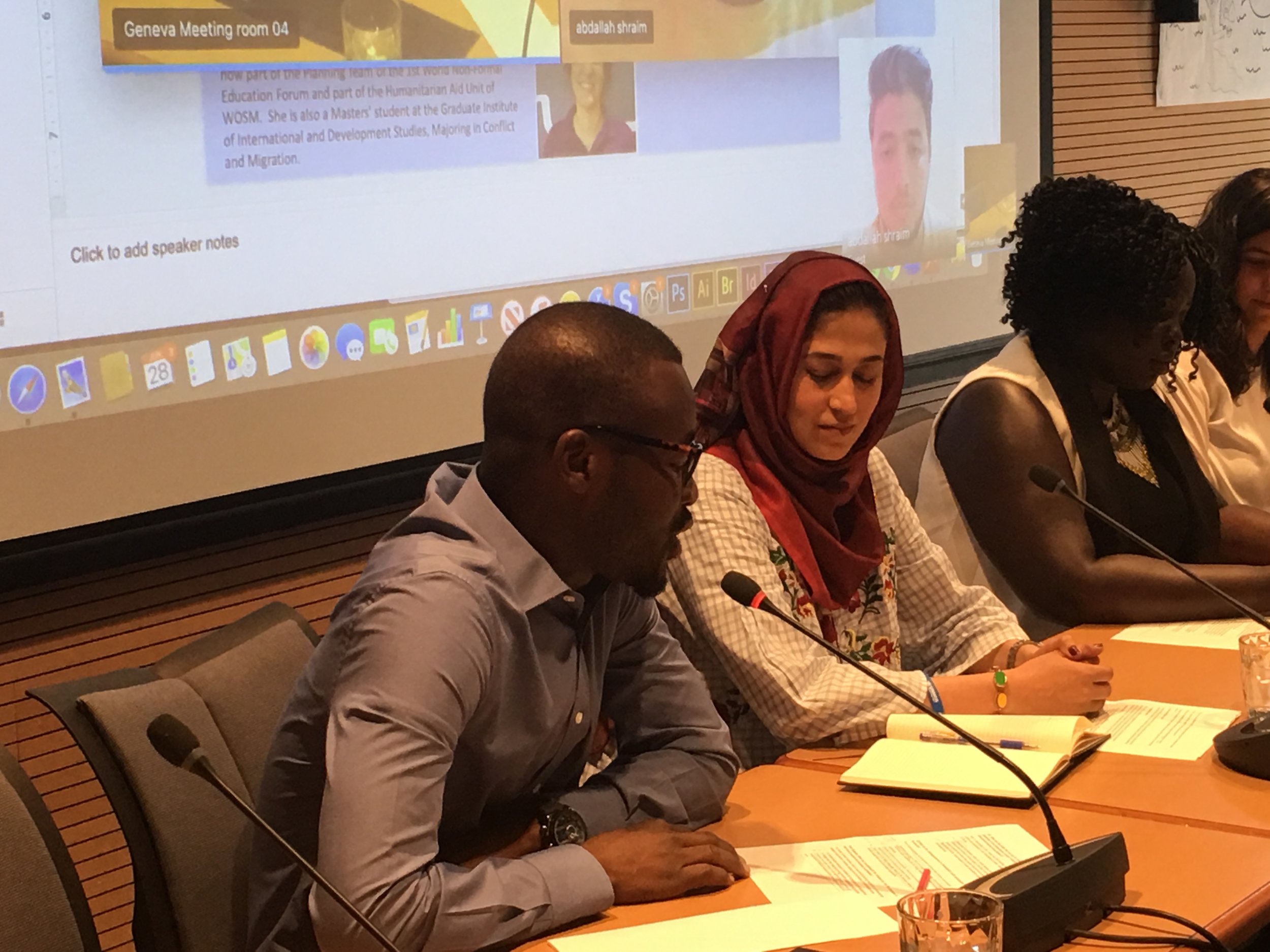Under the auspices of the Compact for Young People in Humanitarian Action, an Inter-Agency Workshop for young humanitarians working in the Ukraine crisis response on the 14th and 16th of June 2022. This training was led by UNICEF in collaboration with UNFPA, UNHCR, the Norway Refugee Council (NRC), ActionAid, the Scouts, Global Refugee Youth Network (GRYN), and the Youth Compact Champions. The overall aim of the workshop was to strengthen the work with -and for- young people supporting displaced and refugee families, peers and communities in Ukraine, Poland, Moldova, Romania, and other surrounding areas.
Virtual Launch : IASC Guidelines on Working with and for Young People
JOIN US for the Virtual Launch of the: With Us & For Us: IASC Guidelines on Working with and for Young People in Humanitarian and Protracted Crises
Launch will be streamed live on 16 February 2021 starting from 9 a.m. (EST)
Key note speaker :
Mark Lowcock, UN Under-Secretary-General for Humanitarian Affairs and Emergency Relief Coordinator
Host:
Jayathma Wickramanayake, United Nations Secretary-General's Envoy on Youth
Speakers:
Valentina Biancoh, Argentina, Youth Compact Champion – Compact for Young People in Humanitarian Action
Henrietta H Fore, Executive Director, UNICEF
Jan Egeland, Secretary-General, The Norwegian Refugee Council (NRC)
Shahidullah Zaland, Afghanistan, Youth Compact Champion - Compact for Young People in Humanitarian Action
Mary Ndiritu, Global learning Consultant, ActionAid
Nada Al-Nashif, United Nations Deputy High Commissioner for Human Rights
Mia Nasrallah, Youth Advisor-Jordan, The Norwegian Refugee Council (NRC)
Sima Sami Bahous, Ambassador and Permanent Representative of the Hashemite Kingdom of Jordan to the United Nations
Tirtha Raj Koirala, Nepal, Youth Compact Champion - Compact for Young People in Humanitarian Action
Niels Annen, Minister of State at the Federal Foreign Office Germany
Martin Bille Hermann, Permanent Representative of Denmark to the UN
Nujeen Mustafa, Youth Refugee and Disabilities Rights Advocate
Filippo Grandi , United Nations High Commissioner for Refugees
Ambassador Ib Petersen, Deputy Executive Director (Management), UNFPA
Bas van Rossum, Global Youth President and Member of the Governing Board, The International Federation of Red Cross and Red Crescent Societies
Tijmen Rooseboom, Ambassador Youth, Education and Work, Ministry of Foreign Affairs of the Netherland
Rein Andre Paulsen, (Norway), Acting Director OCHA Coordination Division
Dr. Michael M. Crow, President, Arizona State University
Annalisa Conte, Director of the WFP Geneva Global Office
Julia Sanchez, Secretary General, ActionAid
Charles Keer Deng, New York, Student and Disability Rights Advocate
The Youth Compact Champions Mark Non-violence Day
To mark International Non-Violence Day (October 2, 2020) the Youth Compact Champions (YCC) are renewing their commitment to non-violence and peace building. Please share the video below with the hashtags #nonvioleceday #youthcompactchampions #youthpower. To assist in further dissemination, the YCC have put together a GoogleDrive and Communications Note.
Stories from Za'atari Camp for Syrian Refugees
This film, produced by UNFPA Jordan, highlights the Compact key action “Participation” inline with the theme of International Youth Day 2020.
The Global Platform for Syrian Students Speaks Out for Investment in Higher Education
By Jorge Sampaio
Former President of Portugal, Chairman of the Global Platform for Syrian Students
Without a shadow of a doubt, more than ever today collective action with bold responses to support and boost higher education opportunities is required. We cannot afford to loose a generation of university students to COVID-19. Providing tertiary education opportunities that empower young people, enhance their resilience and reinforce their skills to thrive and build hope for the future is the only way forward to ensure progress and prosperity for all. Available data shows that the private and social returns of tertiary education are 12.4 per cent in high-income countries. But in developing countries, the social rate of return is 16.4 per cent. Higher education is a true catalyst for social cohesion, the progress of society and human development. Still when things fall apart, human capital is one of the first things to be affected. In our times of global crisis, we really have to gear up for a major push into more support and investments in higher education in order to protect and foster human capital.
For that to happen, we need an emergency fund and innovative and fast-tracking financing tools to refrain the global spread of drop-out in tertiary education and the breakdown of the higher education system as a whole.
For questions or to request further information, contact the Global Platform for Syrian Students.
The Compact Launches in Jordan
For more of the joint statement, visit the Jordan Times here.
Virtual High-level Launch of the Compact feat. Youth and COVID-19 in Jordan,
Under the patronage of MOY and in collaboration with UNFPA, UNHCR, UNICEF, UNDP and NRC, a virtual High-level Launch of the Compact for Young People in Humanitarian and a discussion on Youth and COVID-19 in Jordan, will take place on the 29th of June 2020.
Objectives of the Event:
Officially Launch the Compact for Young People in Humanitarian Action for humanitarian actors in Jordan, and launch the Compact's newest Guidance COVID-19: Working with and for Young People;
Highlight good practices from Jordan of working with and for young people in the COVID-19 response and recognising young people as indispensable stakeholders and decision makers
Discuss the youth humanitarian and development agenda and the implications of COVID-19 on positive youth development.
To confirm your participation, register here.
For further details, contact Bothaina Qamar (UNFPA) at qamar@unfpa.org or Mai Nasrallah (NRF) at mai.nasrallah@nrc.no
Four takeaways from UNFPA Director of Programmes, Dr. Julitta Onabanjo’s conversation with VOA on menstrual health and COVID-19
Menstruation is a natural, and essential, part of the reproductive cycle; roughly half the human population has or will experience it. But too often, menstruation is shrouded in mystery, leading to exclusion, neglect and discrimination. Earlier this month, to celebrate Menstrual Health Day, VOA's Kim Lewis sat down with guest Dr. Julitta Onabanjo, acting director of programs for UNFPA, and VOA's Hayde Adams Fitzpatrick to explore the challenges and breakthroughs women and girls face in menstrual health management, particularly during the COVID-19 pandemic.
Here are some of the highlights:
1 - Menstruation, and menstrual hygiene are human rights issues
Menstruation is intrinsically related to human dignity – when people cannot access safe bathing facilities and safe and effective means of managing their menstrual hygiene, they are not able to manage their menstruation with dignity. Menstruation-related teasing, exclusion and shame also undermine the principle of human dignity.
2 - Stigma and taboos around menstruation exist worldwide
In many or most cultures, around the world and throughout history, misconceptions about menstruation have led to women’s and girls’ exclusion from all kinds of roles and settings – everything from leadership positions to space travel.
3 - Menstruation is not just a woman's issue
While it is true that menstruation is experienced in the bodies of women and girls – as well as other individuals such as non-binary and trans persons – menstrual health issues are human rights issues, and therefore of importance to society as a whole. This means that men and boys must be involved in conversations about gender equality and promoting positive masculinities aiming to eliminate menstruation-associated stigma and discrimination.
4 - COVID-19 is having a huge impact on people’s ability to manage their menstrual health globally
Communities around the world are feeling the numerous and overlapping effects of the COVID-19 pandemic, significantly impacting many women and girls’ ability to manage their menstruation safely and with dignity. Girls who rely on free sanitary products dispensed from their schools are suffering as lockdowns have shut schools and universities, confinement in close quarters, especially in slums and townships, is exacerbating negative gender norms and taboos that shroud menstruation. The financial stress on families who are underemployed due to the pandemic, is pushing some households to prioritise other basic needs like food or household bills over menstruation supplies.
For more, tune in to VOA's conversation with Dr. Onabanjo.
IPPF joins the Compact - Welcome to our 60th Member!
We are pleased to announce that the International Planned Parenthood Federation (IPPF)/ Western Hemisphere region has joined the Compact as its 60th member. IPPF has committed to support the Compact in our efforts to engage young people meaningfully in humanitarian action around the globe . To this end, two focal persons will be joining us to ensure that the Compact’s principles, embodied in our five action areas, are integrated into IPPF decision-making and youth strategies.
Image Credit - IPPF; Sulueti with her son in Nanukuloa village in Ra Province, Fij
IPPF, building on a history of 65 years of achievement, commits to lead a locally owned, globally connected civil society movement that provides and enables services and champions sexual and reproductive health and rights for all, especially the under-served.
At the 3rd International Conference on Planned Parenthood in 1952, eight national family planning associations founded the International Planned Parenthood Federation (IPPF). 67 years later, the charity is a Federation of 132 Member Associations working in 143 countries, with an active presence in a further 21 countries. In 2018, IPPF delivered 223.2 million sexual and reproductive health services in total. The Compact’s co-chairs are delighted to have IPPF join us and look forward to a long and meaningful collaboration.
For more information on the work of IPPF, please visit their homepage here.
Youth Task Force in Za'atari Refugee Camp - Young People and COVID-19
“The Youth Task Force (YTF) is an action-oriented field-level forum, which is focused on youth-specific advocacy, planning and coordination, while addressing the cross-cutting nature of the population group, and works toward advancing the youth agenda in humanitarian settings in line with the Global Compact for Young People in Humanitarian Action.”
Youth Voices
The lockdown that became a learning opportunity!
When 13-year old Salam first visited UNHCR/Blumont’s center one year ago, she was impressed by the number of classes offered at the center. She decided to take part in some of the classes and to commit until she benefitted from the free extra-curricular support. But the start of COVID-19 changed the daily routine drastically, and "teacher Asma asked us to stay home and to create an e-mail instead, to be able to access the Connected Learning Hub Platform", said Salam. This was easier said than done because she had never created an e-mail before. But together with her fellow students, Salam discovered via the internet how to create e-mail to continue the Arabic, English, and Science lessons.
However, internet access in the camp is a constant challenge. But Salam did not let that stop her and instead, she started waking up at dawn to avoid the heaviest hours of internet usage in the camp, with the goal to continue her learning. Studying remotely was a new endeavor, and Salam always thought that the only proper way to study was to be physically present in a classroom together with a teacher. After this new experience, Salam now believes that online learning through digital devices is a great and innovative way to study! As our societies become more digitalized, this option for learning is adding complementary skills that cannot be taught in class!
Practices from the Field
How are Youth Programs in Za'atari Camp Adapting to the Current COVID-19 Response?
Za'atari Refugee Camp is highly affected by the nationwide curfew and lockdown measures. All youth spaces, centers, and programs are not operating due to the government's decision to close all public places; only allowing public hospitals to operate. Many Syrian Refugee youth in the camp have limited access to technology and alternate forms of education and information that are being promoted via virtual platforms and online. Despite the internet connectivity challenges, youth-serving organizations in the camp, with great engagement and participation of young people, have developed alternative methods to continue engaging adolescents and youth in the camp. Below are a few examples:
50 youth volunteers at UNFPA/Questscope Youth Center are utilizing their WhatsApp groups to spread awareness messages to their families, neighborhoods, peers, and social networks about COVID-19. Each volunteer is working via WhatsApp with a group of young people to provide guidance and mentorship on a few selected activities such as music, indoor sports, recreational crafts, English, and tips on life skills and self-development. Mentorship programs remain active through regular phone calls by mentors and mentees, with a focus on coping mechanisms during COVID-19.
Blumont’s learning activities during COVID-19 have been shifted to remote solutions. Instructors and volunteers have been trained to begin remote classes for students and using online platforms to continue engaging youth in the camp while keeping everyone safe. A pilot phase has been conducted during April to get feedback from young people.
UNFPA in partnership with the Royal Health Awareness Society organized a virtual workshop on COVID-19 for the YTF members, youth workers, and educators from the camp. YTF members are mobilizing messages from the national campaign "Elak o Feed" to share reliable and evidence-based information about the pandemic among their youth networks.
UNICEF launched the 14-Days Challenge, where youth are engaged via their social media accounts including 28 activities youth can do at home. In order to engage more youth from the camp, who may have limited accessibility, youth workers shared the challenges via phones and mobilized youth peers through word of mouth. The challenges are available on Facebook and Instagram.
NRC Youth Program did not let the lockdown interrupt the delivery of courses to enrolled youth. All learners that had their courses interrupted were given the opportunity to continue their learning remotely. Through a variety of remote facilitation methodologies and the usage of WhatsApp as a base-learning platform, 238 youth in Za'atari are able to continue their learning in vocational and ICT related courses. To maintain the psychosocial/social engagement approach in the programs, recreational activities such as calligraphy, sketching and reading clubs continued remotely as well as disseminating critical COVID-19 information.
Camp Priorities from Youth in Za’atari
"Daring to ask, listen and act. A snapshot of the impact of COVID-19 on women's and girls’s rights and sexual and reproductive health."
In April 2020, UNFPA Jordan in coordination with Plan International and the Institute for Family Health (IFH)/ Noor Al Hussein Foundation, commissioned a rapid assessment of the COVID-19 situation in Jordan. The aim was to measure the impact of COVID-19 on gender-based violence and sexual and reproductive health (SRH) and rights among women and adolescent girls. One of the findings were that 55% of adolescent girls reported an increase in household tasks including doing chores and looking after younger children in the household, followed by hindered mobility. Adolescent girls are affected by closures of non-formal education opportunities such as women and girls' safe spaces and youth programs, depriving them of social engagement with their peers and educators. Additionally, young girls reported having less information on how they can access SRH services during the lockdown than prior to it. The report recommends recognizing SRH services and rights as essential services (including family planning, sexual health education, and maternal services) and should remain available and open during times of restriction, provided they follow hygiene protocols. Click here to access the assessment.
NRC Internal (Micro) Assessment on Young People
On March 25th-26th 2020, NRC carried out a rapid assessment for young people aged 15-32 across Za’atari and Azraq Refugee camps and host communities to better understand their access to technology and internet, interests, learning priorities and youth ideas and motivation to support their communities as part of the COVID-19 response. According to the findings, 90% of youth own a smartphone but only 14% claim to have engaged in remote online learning this past year. Females, host residents, and youth in formal education are most likely to engage in this form of learning. The top 3 reasons for not pursuing e-learning includes: No/unreliable internet access, preference for classroom-based learning, and no access to required devices. There was a high expression of interest (73%) in remote learning among those who have not previously engaged, particularly among camp residents and older youth. The assessment indicates that although access to smartphones is high, there is a need for greater internet access. As such, remote learning solutions should focus on low-bandwidth methodologies in order to maximize access to learning. NRCs current interventions have been informed by the assessment findings. Click here to access more of the findings.
Useful Links and Resources
The Global Compact for Young people in Humanitarian Settings created a page as a hub for technical resources that can help practitioners in the field best consider young people and adolescents in their responses to the COVID-19 pandemic across sectors.
The Compact have also created a guidance on "COVID-19: Working with and for young people".
GAGE Rapid Assessment - "Exploring the impacts of covid-19 on adolescents in Jordan’s refugee camps and host communities".
Members
The YTF members are: Blumont – Finn Church Aid (FCA) – Institute for Family Health/Noor Al-Hussein Foundation (IFH) – Jordan Health Aid Society (JHAS) – LaLiga - Mercy Corps – Norwegian Refugee Council (NRC) – Questscope - Relief International - Save the Children – UNFPA – UNHCR - UNICEF.
The YTF is chaired by UNFPA and co-chaired by NRC. For further details, please contact Bothaina Qamar at qamar@unfpa.org and Dina Alaeddin at dina.alaeddin@nrc.no.
Secretary-General António Guterres presents his first report on Youth, Peace and Security via VTC to the Security Council
Today, Security Council members held an open video teleconference meeting ‘Towards the fifth anniversary of the youth and peace and security agenda: accelerating implementation of resolutions 2250 and 2419.’ Secretary-General António Guterres presented his first report on Youth, Peace and Security, connecting the dots between the COVID-19 pandemic and the tireless contributions of young peacebuilders around the globe.
He lauded humanitarians and peacebuilders in Ghana, Colombia and Iraq on their critical work delivering supplies to frontline health-workers and maintaining critical social cohesion during lockdown. The SG called for more to be done to address challenges facing young peacebuilders, specifically for the international community to strengthen human rights protections for young activists. He made the case for increased investment in young people’s participation and organisations, stating that investment in young people’s capacities are critical to the achievement of the 2030 agenda.
Jayathma Wickramanayake, the UN Secretary-General’s Envoy on Youth made a statement along with a young peacebuilder Gatwal Augustine Gatkuoth Yul from South Sudan, founder of the “Young-adult Empowerment Initiative” (YEI) in Uganda.
Olla Al-Sakkaf, a young peacebuilder from Yemen and project coordinator in the “Youth Without Border Organization for Development,” while unable to join the VTC, made her remarks online here.
The Secretary General's report on Youth, Peace and Security [S/2020/167] March 2, 2020
The Secretary General’s remarks as delivered on April 27, 2020
Jayathma Wickramanayake, the UN Secretary-General’s Envoy on Youth remarks
War Child Holland joins the Compact - Welcome!
War Child Holland is a humanitarian organization working to improve the resilience and wellbeing of children and young people living with violence and armed conflict. We are proud to welcome War Child Holland into the Compact membership - which includes a rich array of governments, private firms, UN agencies, youth organisations and NGOs.
© War Child Holland
War Child started in 1993 as a handful of Dutch volunteers fundraising to provide support to children living in areas affected by armed violence. Today, War Child is active in 14 countries, together with sister organisations War Child UK and War Child Canada, it reaches the most conflict-affected countries in the world.
War Child Holland works with children, adolescents, young people, caregivers and communities to deliver life-saving programmatic interventions in four streams: child protection, education, psychosocial support and youth empowerment. Their impressive work with youth is co-creative, person-centered and strength-based.
The Compact is delighted to have a vital humanitarian organisation like War Child Holland reaffirming our commitment to ensure the needs, perspectives and capacities of young people are meaningfully included in humanitarian response, and look forward to a rich collaborative partnership.
For more information visit War Child Holland on their homepage.
The Envoy on Youth's Year of Compact Engagement, Greece and Jordan
"Accelerating Localisation of the Compact - Transforming Humanitarian Landscape With and For Young People - 4th annual meeting of the Compact
From June 24thto June 26 IFRC hosted the Compact’s 4th annual meeting which coincided with the ECOSOC Humanitarian Segment, during which the Compact membership, supported by UN Member states, hosted a High-level Side-event on young people in humanitarian Action.
The 4 Annual Meeting, co-organised by IFRC and UNFPA in collaboration with the Office of the UNSG's Envoy on Youth and the UN Major Group on Children and Youth, reviewed the progress in the implementation of the Compact, defined the priorities for 2020-2021and adopted a collective work-plan for the Compact's five core commitments. The meeting contributed to fostering the alignment of policies and strategies in humanitarian action with the key principles of youth engagement while connecting the Compact to the existing humanitarian architecture global processes such as the SDGs, Agenda for Humanity, and the localisation workstream of the Grand Bargain. Here are some of the highlights:
Economic and Social Council Humanitarian Affairs Segment Palais des Nations, Geneva, 24 to 26 June 2019
On 11 April ECOSOC adopted a decision that the theme for the 2019 ECOSOC Humanitarian Affairs Segment (HAS) will be “Promoting action to save lives, reach those in need and reduce humanitarian risk, vulnerability and need: looking towards the seventieth anniversary of the Geneva Conventions of 12 August 1949 and the climate summit called for by the Secretary-General”.
The Humanitarian Affairs Segment opens its doors on 24-26 June at the Palais des Nations in Geneva. Since 1998 the Segment has been an essential platform for discussing issues related to strengthening the coordination and effectiveness of the humanitarian assistance of the United Nations, including assessing progress and identifying emerging issues, obstacles and challenges. It also promotes the sharing of experiences and lessons learned at the national and regional level. The organization of the HAS includes a General Debate, including action on the annual ECOSOC humanitarian resolution, two HighLevel Interactive Panels, and approximately fifteen side-events. The HAS precedes by the annual informal ECOSOC Event on the Transition from Relief to Development, which links discussions between the ECOSOC Operational Activities for Development Segment and the HAS, in the morning of 24 June.
the ECOSOC HAS side event organized under the umbrella of the Compact was held on Monday June 24 from 13.15-14.45 at the UN Palais.

